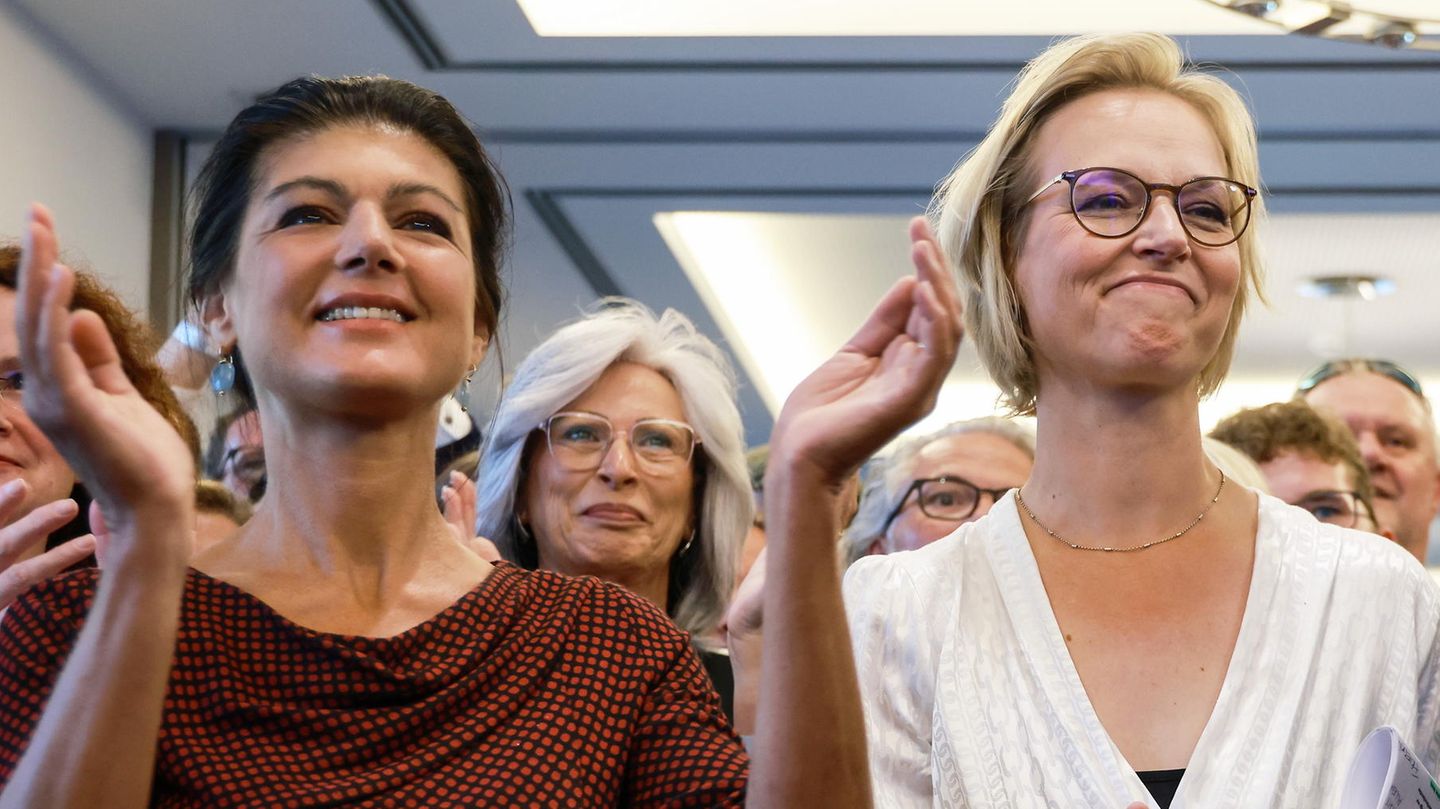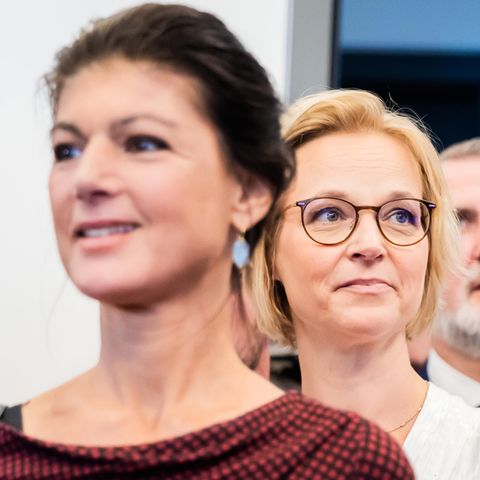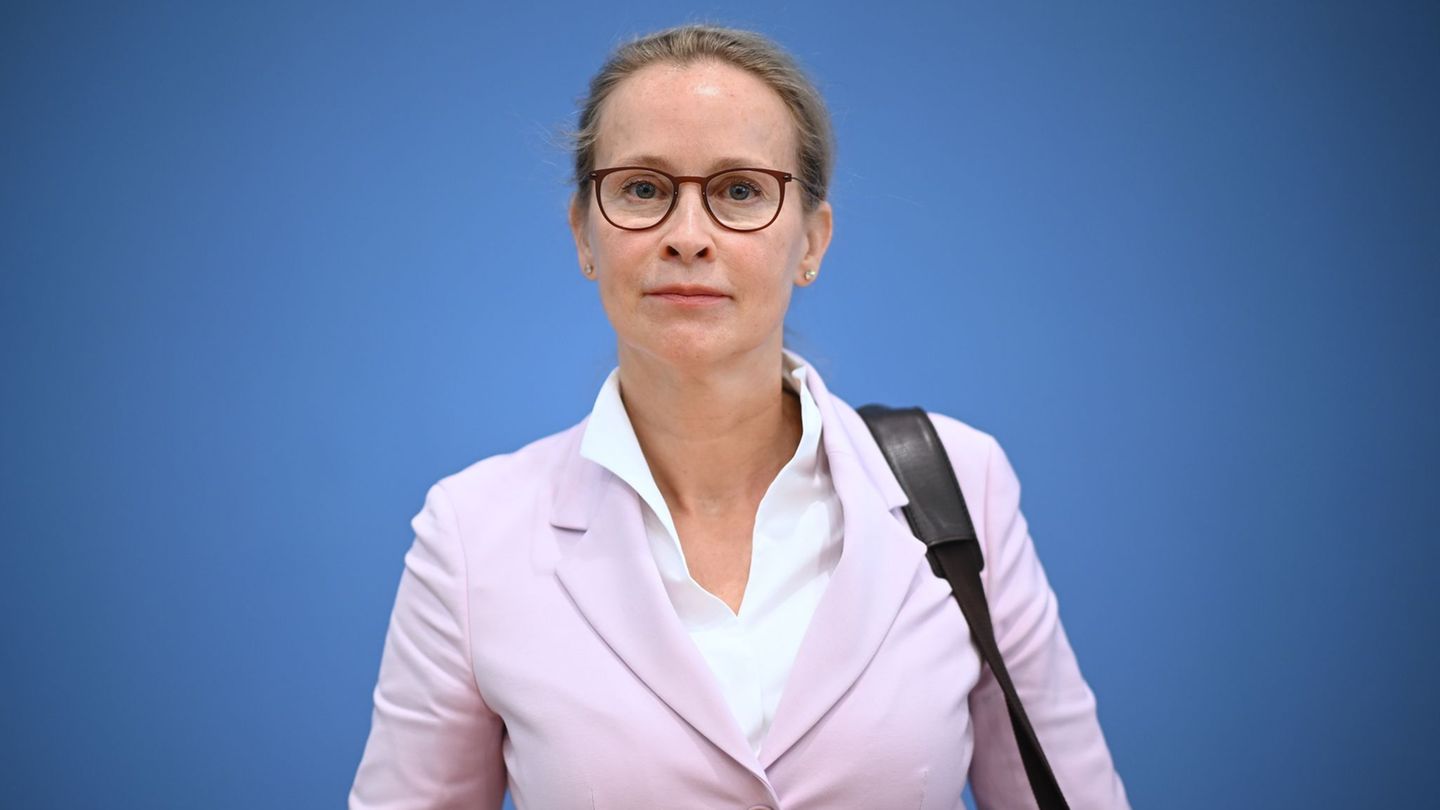analysis
The emancipation of Wagenknecht or: The risk of Erfurt
Copy the current link
An affront for Sahra Wagenknecht: In Thuringia, BSW state chief Katja Wolf agrees with the CDU and SPD to disagree – and still govern.
It was October 28, 2024, at 4:06 p.m. when four visibly exhausted people stepped in front of the cameras and microphones. They had been negotiating for ten days about how to end the Russian war of aggression against Ukraine. And they had argued about whether US medium-range weapons should be stationed on German soil.
The four were not the presidents of nuclear powers or at least the leading representatives of the federal government. No, it was the Thuringian state chairmen of the CDU, BSW and SPD who made their global statements in the Erfurt state parliament.
In order to be able to form a coalition that would make policy for a good two million people in rural central Germany, they had to talk about war and peace. The BSW leadership in Berlin demanded this as a condition for government participation in Thuringia, but also in Saxony and Brandenburg. And so it was demanded above all by the autocratic BSW chairwoman who gave the party its name: Sahra Wagenknecht.
Presentation of the different positions
She doesn’t like what happened in Erfurt. Because the three parties are avoiding the ultimate no to arms deliveries and US missiles that they have been demanding for months. Instead, they present their different positions at the crucial points.
In English they say: Agree to disagree (in German: “to agree to disagree”).
An example of this is this passage from the negotiated document: “The CDU and SPD see themselves in the tradition of ties to the West and Eastern policy. The BSW stands for an uncompromising peace course.” And: “Although we have different opinions on the need to supply arms to Ukraine to defend its territorial integrity and sovereignty, we are united by the goal of a diplomatic solution to the war against Ukraine […] to move forward.”
Regarding the missile issue, it is explained that Thuringia, as a German federal state, is embedded “in a common European security architecture” and that the “defense capability of our country” is “of great importance” for peace. The criticism of the deployment is cited as merely the majority opinion of the surveys: And a future state government will give this view a “public voice”.
Sahra Wagenknecht prevailed in Brandenburg
This is worded much softer than the agreement that the Brandenburg negotiating partners from the SPD and BSW announced on Monday morning. After calling for a ceasefire in Ukraine, it says: “Against this background, we view the planned stationing of medium-range and hypersonic missiles on German soil critically.”
In doing so, Wagenknecht actually managed to get the Brandenburg SPD Prime Minister Dietmar Woidke to publicly distance himself from his SPD Chancellor. Because it was Olaf Scholz who negotiated the deployment with the USA.
In Thuringia, however, this could not be enforced. This was not just due to CDU state leader Mario Voigt, who had to follow the line drawn by his party leader Friedrich Merz. It was also due to a state SPD that, under Georg Maier, never let anyone doubt its solidarity towards Ukraine.
Wagenknecht knew this, and she clearly had no desire for a shaky coalition based on a stalemate anyway – and this also with the CDU, which has a completely different foreign policy position. The BSW chairwoman fears for her strategic starting position for the federal election, which she wants to contest with the label “peace party”.
That’s why Wagenknecht interfered in the negotiations from the beginning – and personally blocked the start of coalition negotiations ten days ago. The peace issue must be clarified first, she decreed. She then began to systematically attack the CDU. In the end, she even accused Merz of wanting to declare war on Russia.
Until the weekend it seemed as if the attrition tactics were successful. But then something happened that had been in the offing for some time. The Thuringian state leader Katja Wolf, who was already a real politician in the PDS, finally emancipated herself from the dictates of Berlin: she announced the agreement together with Voigt and Maier – and this obviously without first obtaining Wagenknecht’s consent. “Formal approval is not planned,” she said when asked whether the federal leadership agreed with the content of the paper.
That is quite remarkable. Yes, those involved in Erfurt are concerned with creative power, influence and positions. That is the nature of politics. But they are obviously also concerned with the country in which they live, while Wagenknecht sees it in particular as a vehicle for their federal political ambitions.
“We have a deep responsibility for Thuringia here,” said BSW state boss Wolf, looking quite pale. Because while she was speaking, her state executive board was still meeting. The talks with Berlin are likely to be tough, especially since what was agreed in Erfurt is now likely to be the template for the negotiations between the CDU, BSW and SPD in Dresden. It was “a mistake” not to “orientate ourselves on the compromise found in Brandenburg”.
The coalition negotiations are scheduled to begin in Erfurt this Tuesday. But even if this happens, the construct remains a risk that could fail at any time.
Source: Stern
I have been working in the news industry for over 6 years, first as a reporter and now as an editor. I have covered politics extensively, and my work has appeared in major newspapers and online news outlets around the world. In addition to my writing, I also contribute regularly to 24 Hours World.





